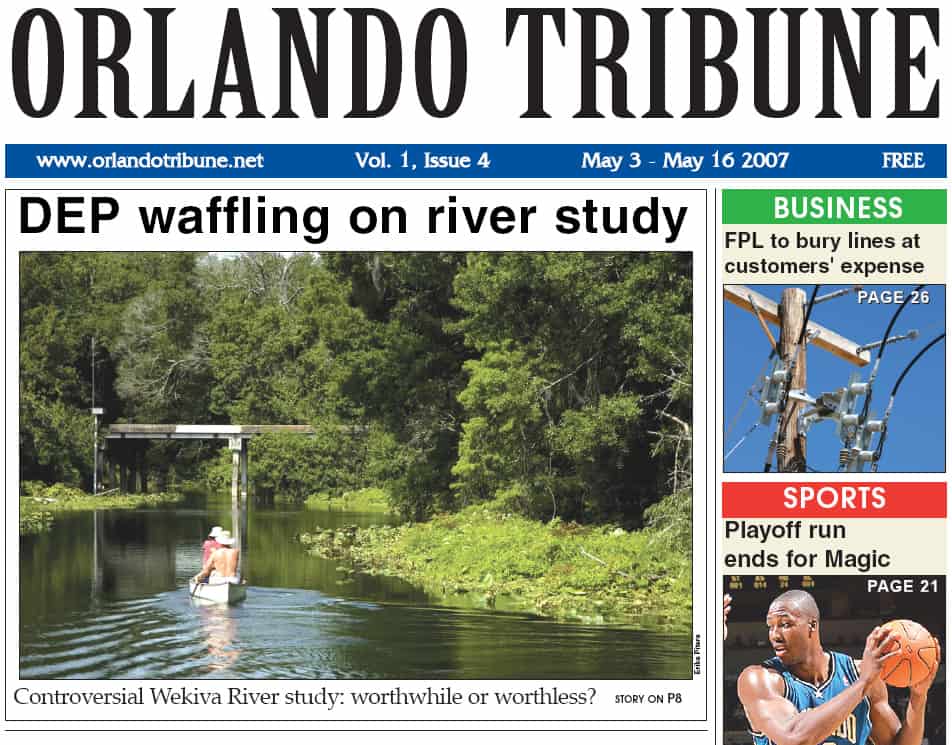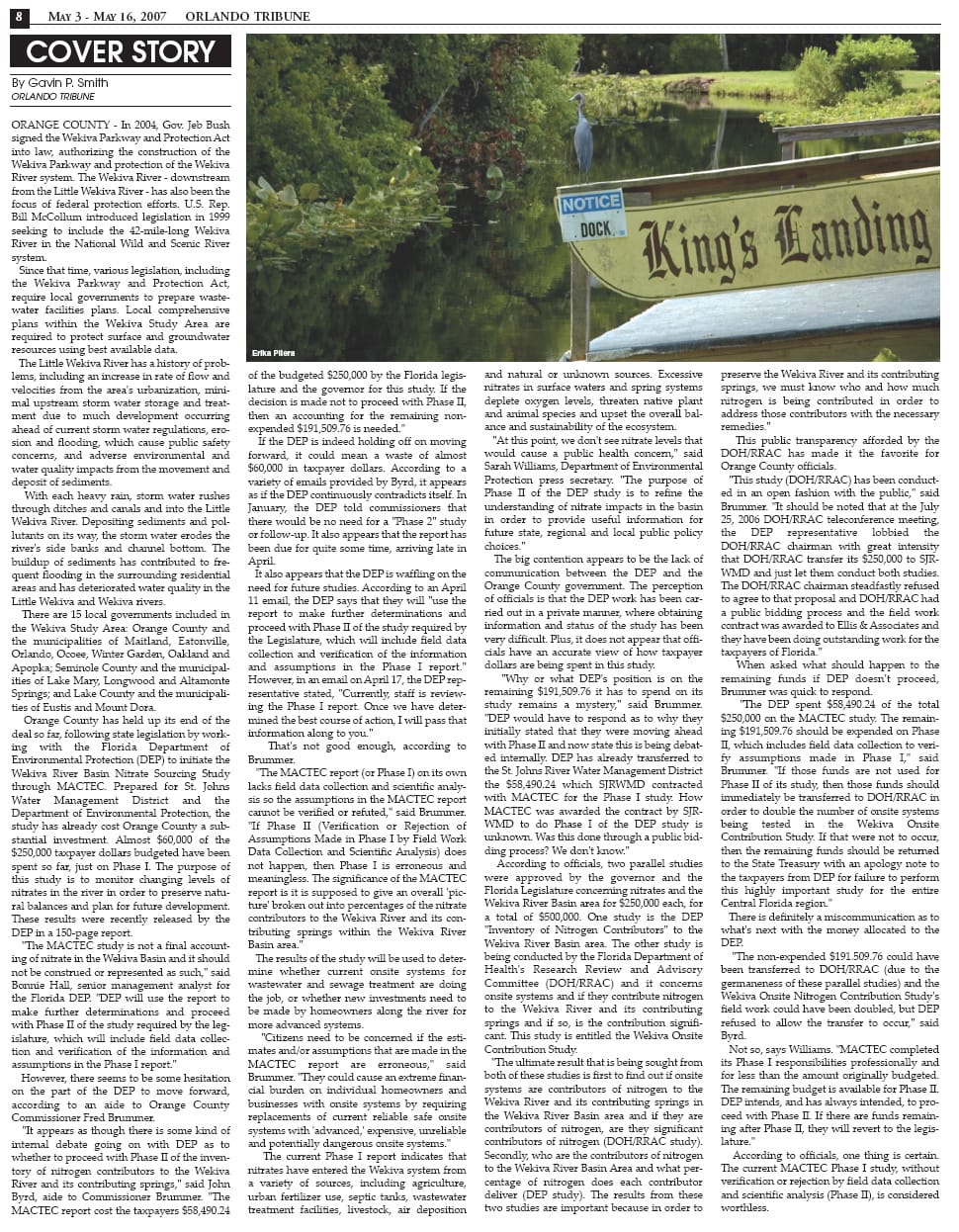
ORANGE COUNTY – In 2004, Governor Jeb Bush signed The Wekiva Parkway and Protection Act into law, authorizing the construction of the Wekiva Parkway and protection of the Wekiva River system. The Wekiva River — downstream from the Little Wekiva River – has also been the focus of federal protection efforts. U.S. Rep. Bill McCollum introduced legislation in 1999 seeking to include the 42-mile-long Wekiva River in the National Wild and Scenic River system.
Since that time, various legislation including The Wekiva Parkway and Protection Act, require local governments to prepare wastewater facilities plans. Local comprehensive plans within the Wekiva Study Area are required to protect surface and groundwater resources using best available data.
The Little Wekiva River has a history of problems, including an increase in rate of flow and velocities from the area’s urbanization, minimal upstream storm water storage and treatment due to much development occurring ahead of current storm water regulations, erosion and flooding, which cause public safety concerns, and adverse environmental and water quality impacts from the movement and deposit of sediments.
With each heavy rain, storm water rushes through ditches and canals and into the Little Wekiva River. Depositing sediments and pollutants on its way, the storm water erodes the river’s side banks and channel bottom. The buildup of sediments has contributed to frequent flooding in the surrounding residential areas and has deteriorated water quality in the Little Wekiva and Wekiva rivers.
There are 15 local governments included in the Wekiva Study Area: Orange County and the municipalities of Maitland, Eatonville, Orlando, Ocoee, Winter Garden, Oakland and Apopka; Seminole County and the municipalities of Lake Mary, Longwood, and Altamonte Springs; and Lake County and the municipalities of Eustis, and Mount Dora.
Orange County has held up its end of the deal so far, following state legislation by working with the Florida Department of Environmental Protection to initiate the Wekiva River Basin Nitrate Sourcing Study through MACTEC. Prepared for St. Johns Water Management District and the Department of Environmental Protection, the study has already cost Orange County a substantial investment. Just under $60,000 of the $250,000 taxpayer dollars budgeted have been spent so far, just on Phase one. The purpose of this study is to monitor changing levels of nitrates in the river, in order to preserve natural balances and plan for future development. These results were recently released by the DEP in a 150-page report.
“The MACTEC study is not a final accounting of Nitrate in the Wekiva Basin and it should not be construed or represented as such,” said Bonnie Hall, Senior Management Analyst for the Florida DEP. “DEP will use the report to make further determinations and proceed with Phase II of the study required by the Legislature, which will include field data collection and verification of the information and assumptions in the Phase I report.”

However, there seems to be some hesitation on the part of the DEP to move forward, according to an aide to Commissioner Frederick C. Brummer of Orange County.
“It appears as though there is some kind of internal debate going on with DEP as to whether to proceed with Phase II (Field Data Collection to Verify the Information and Assumptions made in the MACTEC Report) of the Inventory of Nitrogen Contributors to the Wekiva River and its contributing springs,” said John Byrd, aide to Commissioner Brummer. “The MACTEC Report cost the taxpayers $58,490.24 of the budgeted $250,000 by The Florida Legislature and the Governor for this Study. If the decision is made not to proceed with Phase II, then an accounting for the remaining non-expended $191,509.76 is needed. “
If the DEP is indeed holding out on moving forward, it could mean a waste of almost $60,000 in taxpayer dollars. According to a variety of emails provided by Byrd, it appears as if the DEP continuously contradicts itself. In January, the DEP told Commissioners that there would be no need for a “Phase 2” study or follow-up. It also appears that the report has been due for quite some time, arriving late in April.
It also appears that the DEP is waffling on the need for future studies. According to an April 11 email, the DEP says that they will “use the report to make further determinations and proceed with Phase II of the study required by the Legislature, which will include field data collection and verification of the information and assumptions in the Phase I report.” However, in an email following on April 17th, the DEP states that “Currently, staff is reviewing the Phase I report. Once we have determined the best course of action, I will pass that information along to you.”
That’s not good enough, according to Orange County Commissioner Frederick C. Brummer.
“The MACTEC report (or Phase I) on its own lacks field data collection and scientific analysis so the assumptions in the MACTEC report (Phase I) cannot be verified or refuted,” said Brummer. “If Phase II (Verification or Rejection of Assumptions Made in Phase I by Field Work Data Collection and Scientific Analysis) does not happen then Phase I (MACTEC Study) is erroneous and meaningless.”
I spoke recently with Commissioner Brummer about the significance of the report, and what should happen next.
“The significance of the MACTEC report is it is suppose to give an overall “picture” broken out into percentages of the nitrate contributors to the Wekiva River and its contributing springs within the Wekiva River Basin Area,” said Orange County Commissioner Frederick C. Brummer.
The results of the study will be used to determine whether current onsite systems for wastewater and sewage treatment are doing the job, or whether new investments need to be made by homeowners along the river for more advanced systems.
“Citizens need to be concerned if the estimates and/or assumptions that are made in the MACTEC report are erroneous,” said Commissioner Brummer. “They could cause an extreme financial burden on individual homeowners and businesses with onsite systems by requiring replacements of current reliable safe onsite systems with “advanced” expensive, unreliable and potentially dangerous onsite systems.”
The current Phase 1 report indicates that nitrates have entered the Wekiva system from a variety of sources, including agriculture, urban fertilizer use, septic tanks, wastewater treatment facilities, livestock, air deposition, and natural or unknown sources. Excessive nitrates in surface waters and spring systems deplete oxygen levels, threaten native plant and animal species, and upset the overall balance and sustainability of the ecosystem.
“At this point, we don’t see nitrate levels that would cause a public health concern,” said Sarah P. Williams, Department of Environmental Protection Press Secretary. “The purpose of phase II of the DEP study is to refine the understanding of nitrate impacts in the basin in order to provide useful information for future state, regional and local public policy choices.”
The big contention appears to be the lack of communication between the DEP and the Orange County government. The perception of officials is that the DEP work has been carried out in a private manner, where obtaining information and status of the study has been very difficult. Plus, it does not appear that officials have an accurate view of how taxpayer dollars are being spent in this study.
“Why or what DEP’s position is on the remaining $191,509.76 it has to spend on its study remains a mystery,” said Brummer. “DEP would have to respond as to why they initially stated that they were moving ahead with Phase II and now state this is being debated internally. DEP has already transferred to the St. John’s River Water Management District the $58,490.24 which SJRWMD contracted with MACTEC for the Phase I study. How MACTEC was awarded the contract by SJRWMD to do Phase I of the DEP study is unknown. Was this done through a public bidding process? We don’t know.”
According to officials, two parallel studies were approved by the Governor and The Florida Legislature concerning nitrates and the Wekiva River Basin Area each for $250,000 for a total of $500,000. One study is the DEP “Inventory of Nitrogen Contributors” to the Wekiva River Basin Area. The other study is being conducted by the Florida Department of Health’s Research Review and Advisory Committee and it concerns onsite systems and if they contribute nitrogen to the Wekiva River and its contributing springs and if so is the contribution significant. This study is entitled the Wekiva Onsite Contribution Study.
“The ultimate result that is being sought from both of these studies is first to find out if onsite systems are contributors of nitrogen to the Wekiva River and its contributing springs in the Wekiva River Basin Area and if they are contributors of nitrogen are they significant contributors of nitrogen (DOH/RRAC Study). Secondly, who are the contributors of nitrogen to the Wekiva River Basin Area and what percentage of nitrogen does each contributor deliver (DEP Study). The results from these two studies are important because in order to preserve the Wekiva River and its contributing springs we must know who and how much nitrogen is being contributed in order to address those contributors with the necessary remedies.”
This public transparency afforded by the DOH/RRAC has made it the favorite for Orange county officials.
“This study (DOH/RRAC) has been conducted in an open fashion with the public,” said Brummer. “It should be noted that at the 25 July 2006 DOH/RRAC teleconference meeting the DEP representative lobbied the DOH/RRAC Chairman with great intensity that DOH/RRAC transfer its $250,000 to SJRWMD and just let them conduct both studies. The DOH/RRAC Chairman steadfastly refused to agree to that proposal and DOH/RRAC had a public bidding process and the field work contract was awarded to Ellis & Associates and they have been doing outstanding work for the taxpayers of Florida.”
The next DOH/RRAC meeting is scheduled for 8 May 2007 at Sylvan Lake Park beginning at 9:30am.
When asked what should happen to the remaining funds if DEP doesn’t proceed, Commissioner Brummer was quick to respond.
“The DEP spent $58,490.24 of the total $250,000 on the MACTEC study. The remaining $191,509.76 should be expended on Phase II, which includes field data collection to verify assumptions made in Phase I,” said Brummer. “If those funds are not used for Phase II of its study then those funds should immediately be transferred to DOH/RRAC in order to double the number of onsite systems being tested in the Wekiva Onsite Contribution Study. If that were not to occur then the remaining funds should be returned to the State Treasury with an apology note to the taxpayers from DEP for failure to perform this highly important study for the entire Central Florida region.”
There is definitely a miscommunication as to what’s next with the money allocated to the DEP.
“The non-expended $191.509.76 could have been transferred to DOH/RRAC (due to the germaneness of these parallel studies) and the Wekiva Onsite Nitrogen Contribution Study’s field work could have been doubled, but DEP refused to allow the transfer to occur,” according to aide John Byrd.
Not so, says Williams. “MACTEC completed its Phase I responsibilities professionally and for less than the amount originally budgeted. The remaining budget is available for phase II. DEP intends, and has always intended, to proceed with Phase II. If there are funds remaining after Phase II, they will revert to the legislature.”
Regardless of the communication issues here, according to officials, one thing is certain. The current MACTEC Phase I study, without verification or rejection by field data collection and scientific analysis (Phase II), is considered worthless.
